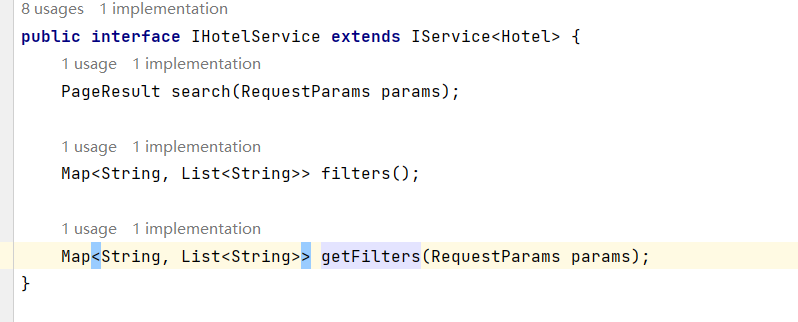做网站.net和php哪个简单湖南最新消息今天
es聚合
#ES中的聚合操作 参与聚合的字段必须是keword、数值、日期、布尔
#1.Bucket桶聚合(文档字段分组,日期分组)2.Metric度量聚合(最大值,最小值,平均值)
#3.Pipeline管道聚合(其他聚合的结果为基础做聚合)#桶聚合 第一个size:聚合中不包含文档,只包含聚合结果。size:希望获得聚合结果的数量 doc_count:是文档数量,桶里面有几条文档啊,是倒叙排序
#统计所有数据中酒店品牌有几种
GET /hotel/_search
{"size":0,"aggs": {"brandAgg": {"terms": {"field": "brand","size": 10}}}
}#更改排序、添加限定聚合搜索的范围
GET /hotel/_search
{"query": {"range": {"price": {"gte": 0,"lte": 200}}}, "size":0,"aggs": {"brandAgg": {"terms": {"field": "brand","order": {"_count": "asc"}, "size": 10}}}
}#Metrics聚合
#统计每个品牌用户的评分的最大值、最小值 排序根据平均降序分排序
#里面的aggs是对brand的子聚合,也就是分组后对分组分别计算 stats:可以计算min、max、avg...
GET /hotel/_search
{"size":0,"aggs": {"brandAgg": {"terms": {"field": "brand","size": 10,"order": {"scoreAgg.avg": "desc"}},"aggs":{"scoreAgg":{"stats": {"field": "score"}}}}}
} /***桶聚合*/@Testvoid testAggregation() throws IOException {//1.准备requestSearchRequest request=new SearchRequest("hotel");//DSLrequest.source().size(0);//聚合request.source().aggregation(AggregationBuilders.terms("brandAgg").field("brand").size(10));//3发送请求SearchResponse response=client.search(request,RequestOptions.DEFAULT);//4.解析结果System.out.println(response);//聚合解析Aggregations aggregations = response.getAggregations();//解析结果//根据聚合名称获取聚合结果Terms brandTerms = aggregations.get("brandAgg");//获取BucketsList<? extends Terms.Bucket> buckets = brandTerms.getBuckets();//遍历for (Terms.Bucket bucket:buckets){//获取keyString key = bucket.getKeyAsString();System.out.println(key);}}
多条件聚合:
//多条件聚合@Testvoid contextLoad(){Map<String, List<String>> result=hotelService.filters();System.out.println(result);}
//多参数聚合:品牌、城市、星级聚合@Overridepublic Map<String, List<String>> filters() {try {//准备RequestSearchRequest request=new SearchRequest("hotel");//DSLrequest.source().size(0);//聚合buildAggregations(request);//3发送请求SearchResponse response=restHighLevelClient.search(request,RequestOptions.DEFAULT);//4.解析结果System.out.println(response);//聚合解析Map<String, List<String>> result=new HashMap<>();Aggregations aggregations = response.getAggregations();//解析结果List<String> brandList = getAggregationByName(aggregations,"brandAgg");result.put("品牌",brandList);List<String> cityList = getAggregationByName(aggregations, "cityAgg");result.put("城市",cityList);List<String> starList = getAggregationByName(aggregations, "starAgg");result.put("星级",starList);return result;} catch (IOException e) {throw new RuntimeException(e);}}//聚合封装private void buildAggregations(SearchRequest request) {request.source().aggregation(AggregationBuilders.terms("brandAgg").field("brand").size(100));request.source().aggregation(AggregationBuilders.terms("cityAgg").field("city").size(100));request.source().aggregation(AggregationBuilders.terms("starAgg").field("starName").size(100));}//封装解析方法private List<String> getAggregationByName(Aggregations aggregations, String aggName) {// 4.1.根据聚合名称,获取聚合结果Terms terms = aggregations.get(aggName);// 4.2.获取bucketsList<? extends Terms.Bucket> buckets = terms.getBuckets();// 4.3.遍历List<String> list = new ArrayList<>(buckets.size());for (Terms.Bucket bucket : buckets) {String brandName = bucket.getKeyAsString();list.add(brandName);}return list;}
查询酒店数据的请求

filters:查询酒店过滤项的请求
他们两个查询携带的参数是一样的
过滤项查询也要带条件,过滤项查询将来需要聚合来实现 ,聚合一旦加了条件,是在限定聚合的范围

发现这两个请求携带的参数是一样的,为什么查过滤项的时候也要带条件呢?过滤项查询要通过聚合来实现,聚合一带上条件就来限定聚合的范围,为何要限定范围呢?直接对整个索引库做聚合不行呢?
在搜索是没有加条件,搜索的是索引库的所有数据,对所有数据做聚合得到城市和品牌没有问题,但是当输入内容虹桥,得到的数据一定是跟上海虹桥有关的结果
上海虹桥有关的城市对应的一定是上海,但是对索引库的所有数据做聚合,得到的城市一定包含所有的城市,所以用户一定就很奇怪拉,命名搜索的是上海的还能出现北京的吗?如果再点击北京在结合搜索条件虹桥,能搜到任何东西吗?肯定是不能的北京没有虹桥,所以说不应该对索引库的所有字段做聚合,用户条件是虹桥,就应该对虹桥相关的酒店做聚合,限定聚合的范围,需要加查询条件,查询时用什么条件聚合时也用什么条件,这样就是在酒店的基础上做聚合,这样查询结果就更精确了因此,在查询过滤项时和查询时要用相同的条件
@PostMapping("filters")public Map<String, List<String>> getFilters(@RequestBody RequestParams params) {return hotelService.getFilters(params);} 
@Overridepublic Map<String, List<String>> getFilters(RequestParams params) {try {//准备RequestSearchRequest request=new SearchRequest("hotel");//请求参数 querybuildBasicQuery(params,request);//DSLrequest.source().size(0);//聚合buildAggregations(request);//3发送请求SearchResponse response=restHighLevelClient.search(request,RequestOptions.DEFAULT);//4.解析结果System.out.println(response);//聚合解析Map<String, List<String>> result=new HashMap<>(3);Aggregations aggregations = response.getAggregations();//解析结果List<String> brandList = getAggregationByName(aggregations,"brandAgg");result.put("brand",brandList);List<String> cityList = getAggregationByName(aggregations, "cityAgg");result.put("city",cityList);List<String> starList = getAggregationByName(aggregations, "starAgg");result.put("starName",starList);return result;} catch (IOException e) {throw new RuntimeException(e);}}
